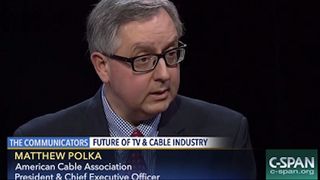ACA's Polka: Cable Side of Business Is Failing

American Cable Association president Matt Polka says that while his members still consider themselves in the cable business that business is "failing."
Polka was being interviewed for an episode of C-SPAN's Communicators series, which will air Saturday, June 3, at 6:30 p.m. on C-SPAN, with re-airings Monday, June 5, at 8 a.m. and 8 p.m. on CSPAN2. Interviewer Peter Slen pointed to a Multichannel News story about ACA's annual summit that pointed out Cable One was no longer marketing its video services because of high cost, focusing on broadband.
"The cable business isn't what it used to be because of the high costs—the increasing costs of not only cable programming and sports programming and broadcast programming through retransmission consent—and as a business it is failing," said Polka. "It is very, very difficult in some cases for an operator to break even on the cable side," which is why broadband was so important, he said.
Tom Larsen—senior VP of government and public relations for ACA member Mediacom, who was also interviewed for the program—called cable his companies "worst product" in terms of making the least amount of money. But while it is a challenging business, Mediacom is not ready to abandon it yet, he said, while hoping that someday Mediacom's programming "business partners" will be more "sensible" on pricing.
Polka says cord-cutting is the "video issue of our time," saying over-the-top (OTT) video is giving customers more choice than the bundle of linear cable programming.
But Polka said cable operators were not just watching from the sidelines as the Hulus and Amazon Primes of the world proliferate. He said they are providing consumers with more choice as well, "through on demand, through availability of over the top services, as well as making sure that their broadband plant is fast enough to support a video consumer's habits.
Larsen was asked why cable did not move to a skinny bundle model in the face of that increased over-the-top choice and control.
Broadcasting & Cable Newsletter
The smarter way to stay on top of broadcasting and cable industry. Sign up below
Larsen put most of the blame on programmers. "They would rather continue to reap the cash from that platform and grow outside of that platform with newer over-the-top providers."
He said if they were able to do a skinny bundle they would be able to drop channels from their expanded basic lineup and programmers don't want that. Larsen said another way to get more sensible about pricing is to rein in the "reckless" spending on sports rights.
Asked why not an a la carte model, Polka said for the same reason. "It is the companies that control the content and the distribution rights."
He pointed to carriage agreements that require minimum subscriber reach or there is a rate penalty. "So it is very difficult for operators to create that choice for consumers."
While Polka said ACA was hopeful that the new Republican Administration would bring more balance to communications regulation, so that Mediacom can lower the costs of regulatory compliance and raise its investment in plant.
Larsen said he did not expect Pai to address an issue of great importance—retransmission consent—the fastest growing cost of his business.
Contributing editor John Eggerton has been an editor and/or writer on media regulation, legislation and policy for over four decades, including covering the FCC, FTC, Congress, the major media trade associations, and the federal courts. In addition to Multichannel News and Broadcasting + Cable, his work has appeared in Radio World, TV Technology, TV Fax, This Week in Consumer Electronics, Variety and the Encyclopedia Britannica.

